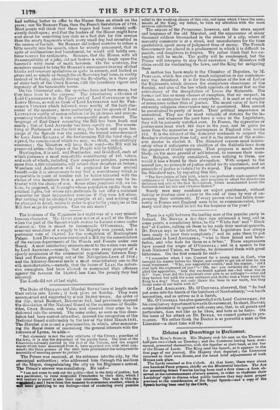The Duke of ORLEANS and Marshal SOULT have at length
made their entree into Lyons ; it took place on Sunday. They were accompanied and supported by about 30,000 troops. An order of the day, dated Belmont, December 2nd, had previously decreed the dissolution of the National Guard of the communes of Guillo- tiare, Croix Rousse, and Vaise, and directed their arms to be delivered into the arsenal. The same order, as soon as this disso- lution had been carried into effect, decreed the recognition of the National Guard conformably to the law of the 22nd March 1831. The Marshal also issued a proclamation, in which, after announc- ing the Royal desire of reconciling the general interests with the interests of Lyons, he adds- " But clemency is not the only attribute of the Crown ; guardian of the laws, it is also the depositary of the public force. The wish of the Chambers solemnly carried to the foot of the Throne, and the august words which have descended from it, have apprized you with what una- surinty.the three powers of the state have proclaimed the indispensable necessity of assuring power to justice."
'The Prince was received, at his entrance into the city, by the municipal authorities; who addressed him through the medium of the Mayor, Congratulating the city on his Highness's arrival.. Tjae Prince's answer was conciliatory. He said— "I am not come to seek out the guilty—that is the duty of justice; but. as-a pacificator, to recal misguided Frenchufen to their duty, which I will venture to assert is also their real interests. This task is this.day cspJt,ad I have from this raiment tocommence anotherewbich is awl more gratifying to my feelings—that of rendering every possible
relief to the working classes of this city, and upon which I have the corn. mands of the King, my father, to turn my attention with the most anxious solicitude."
The seizure of the Prkurseur, however, and the stern aspect and language of the old Marshal, and the appearance of many thousand soldiers bivouacked in the streets of a city, where of necessity commerce is at a stand, and manufactures for the time annihilated, speak more of judgment than of mercy. The French Government are placed in a predicament in which it is difficult to punish, and dangerous to forgive. We rather think that few ex- amples will be made. The guilty will be condemned, but the Prince will interpose to stay their execution ; the Ministers will claim credit for vindicating the laws, and the King for mitigating them A motion has been made in the Chamber of Deputies, by M. PORTALIS, which has excited much indignation in our contempo- rary the Standard. It is for the abrogation of the law of Louis the Eighteenth which decrees the compulsory observance of the Sunday, and also of the law which appoints an annual fast on the anniversary of the decapitation of Louis the Sixteenth. The former law has so many clauses of exception, that we suspect, Ira France, as analogous laws are everywhere, it is used as an engine of annoyance rather than of justice. The moral value of laws for enforcing religious observances may be questioned. Men cannot be constrained to purity of heart. Their political importance is undoubted. They are the most valuable of statutes for the la- bourer; and wherever the poor have a voice in the Legislature, they will be jealously watched over. In France, the apprentice or journeyman must work 365 clays in the year, and he gains no more than the apprentice or journeyman in England who works 313. It is the interest of the democrat workman to respect the Sunday's abstinence from toil ; and it is the interest of the aristo- crat master to abolish it. The Standard reasons most inaccu- rately when it anticipates an abolition of the Sabbath-laws from the progress of liberal opinions. That progress is much more likely, on the mere ground of self-interest, to increase their num- ber. Religion, strictly considered, owes nothing to them, nor would it lose a friend by their abrogation. With respect to the second law, no principle of justice called for its enactment, and no principle of justice is violated by its repeal. The correspondent of the Standard says, by repealing this law, "The Revolution of July 1830, which was professedly made against the ordinances of Charles the Tenth, now proposes to adopt the murderous decisions and acts of the first Revolution, which assassinated Louis the Sixteenth and his fair and virtuous Queen."
Surely men may condemn an unjust punishment, without fasting or feasting once a year to the end of time by way of ex- pressing their sentiments. If every person who had fallen inno- cently in France and England were to be so commemorated, how many civil days would be left for the business of the year?


























 Previous page
Previous page